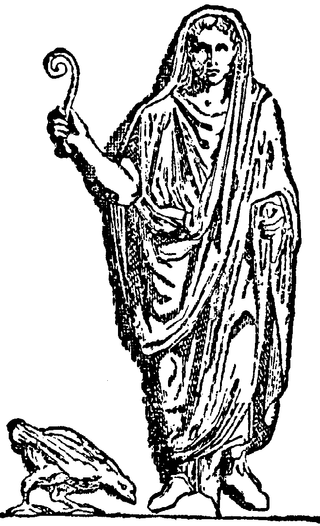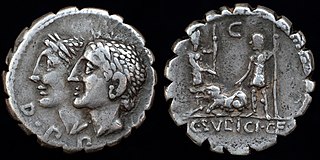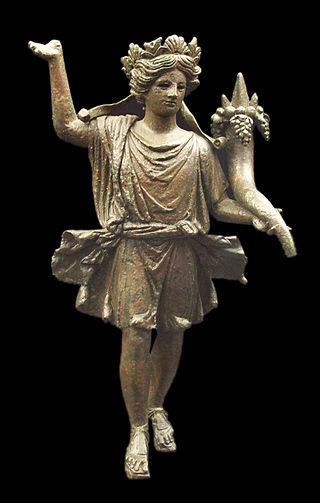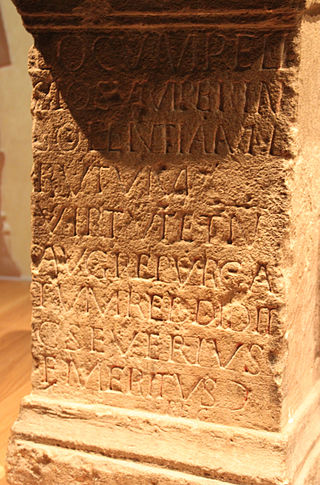
Jupiter, also known as Jove, is the god of the sky and thunder, and king of the gods in ancient Roman religion and mythology. Jupiter was the chief deity of Roman state religion throughout the Republican and Imperial eras, until Christianity became the dominant religion of the Empire. In Roman mythology, he negotiates with Numa Pompilius, the second king of Rome, to establish principles of Roman religion such as offering, or sacrifice.

An augur was a priest and official in the classical Roman world. His main role was the practice of augury, the interpretation of the will of the gods by studying events he observed within a predetermined sacred space (templum). The templum corresponded to the heavenly space above. The augur's decisions were based on what he personally saw or heard from within the templum; they included thunder, lightning and any accidental signs such as falling objects, but in particular, birdsigns; whether the birds he saw flew in groups or alone, what noises they made as they flew, the direction of flight, what kind of birds they were, how many there were, or how they fed. This practice was known as "taking the auspices". As circumstance did not always favour the convenient appearance of wild birds or weather phenomena, domesticated chickens kept for the purpose were sometimes released into the templum, where their behaviour, particularly how they fed, could be studied by the augur.

In ancient Roman religion and mythology, Liber, also known as Liber Pater, was a god of viticulture and wine, male fertility and freedom. He was a patron deity of Rome's plebeians and was part of their Aventine Triad. His festival of Liberalia became associated with free speech and the rights attached to coming of age. His cult and functions were increasingly associated with Romanised forms of the Greek Dionysus/Bacchus, whose mythology he came to share.

Bona Dea was a goddess in ancient Roman religion. She was associated with chastity and fertility in Roman women, healing, and the protection of the state and people of Rome. According to Roman literary sources, she was brought from Magna Graecia at some time during the early or middle Republic, and was given her own state cult on the Aventine Hill.

In ancient Roman religion, the Di Penates or Penates were among the dii familiares, or household deities, invoked most often in domestic rituals. When the family had a meal, they threw a bit into the fire on the hearth for the Penates. They were thus associated with Vesta, the Lares, and the Genius of the pater familias in the "little universe" of the domus.

In ancient Roman religion and myth, Janus is the god of beginnings, gates, transitions, time, duality, doorways, passages, frames, and endings. He is usually depicted as having two faces. The month of January is named for Janus (Ianuarius). According to ancient Roman farmers' almanacs, Juno was mistaken as the tutelary deity of the month of January, but Juno is the tutelary deity of the month of June.

Religion in ancient Rome consisted of varying imperial and provincial religious practices, which were followed both by the people of Rome as well as those who were brought under its rule.
Cult is the care owed to deities and temples, shrines, or churches. Cult is embodied in ritual and ceremony. Its present or former presence is made concrete in temples, shrines and churches, and cult images, including votive offerings at votive sites.

Juno was an ancient Roman goddess, the protector and special counsellor of the state. She was equated to Hera, queen of the gods in Greek mythology and a goddess of love and marriage. A daughter of Saturn, she was the sister and wife of Jupiter and the mother of Mars, Vulcan, Bellona and Juventas. Like Hera, her sacred animal was the peacock. Her Etruscan counterpart was Uni, and she was said to also watch over the women of Rome. As the patron goddess of Rome and the Roman Empire, Juno was called Regina ("Queen") and was a member of the Capitoline Triad, centered on the Capitoline Hill in Rome, and also including Jupiter, and Minerva, goddess of wisdom.
Publius Nigidius Figulus was a scholar of the Late Roman Republic and one of the praetors for 58 BC. He was a friend of Cicero, to whom he gave his support at the time of the Catilinarian conspiracy. Nigidius sided with the Optimates in the civil war between Julius Caesar and Pompeius Magnus.

Lares were guardian deities in ancient Roman religion. Their origin is uncertain; they may have been hero-ancestors, guardians of the hearth, fields, boundaries, or fruitfulness, or an amalgam of these.

The Roman imperial cult identified emperors and some members of their families with the divinely sanctioned authority (auctoritas) of the Roman State. Its framework was based on Roman and Greek precedents, and was formulated during the early Principate of Augustus. It was rapidly established throughout the Empire and its provinces, with marked local variations in its reception and expression.

Saturn was a god in ancient Roman religion, and a character in Roman mythology. He was described as a god of time, generation, dissolution, abundance, wealth, agriculture, periodic renewal and liberation. Saturn's mythological reign was depicted as a Golden Age of abundance and peace. After the Roman conquest of Greece, he was conflated with the Greek Titan Cronus. Saturn's consort was his sister Ops, with whom he fathered Jupiter, Neptune, Pluto, Juno, Ceres and Vesta.

The vocabulary of ancient Roman religion was highly specialized. Its study affords important information about the religion, traditions and beliefs of the ancient Romans. This legacy is conspicuous in European cultural history in its influence on later juridical and religious vocabulary in Europe, particularly of the Western Church. This glossary provides explanations of concepts as they were expressed in Latin pertaining to religious practices and beliefs, with links to articles on major topics such as priesthoods, forms of divination, and rituals.
Granius Flaccus was an antiquarian and scholar of Roman law and religion, probably in the time of Julius Caesar and Augustus.

Roman mythology is the body of myths of ancient Rome as represented in the literature and visual arts of the Romans. One of a wide variety of genres of Roman folklore, Roman mythology may also refer to the modern study of these representations, and to the subject matter as represented in the literature and art of other cultures in any period. Roman mythology draws from the mythology of the Italic peoples and ultimately from Proto-Indo-European mythology.

The Latin term religiō, the origin of the modern lexeme religion, is of ultimately obscure etymology. It is recorded beginning in the 1st century BC, i.e. in Classical Latin at the end of the Roman Republic, notably by Cicero, in the sense of "scrupulous or strict observance of the traditional cultus". In classic antiquity, it meant conscientiousness, sense of right, moral obligation, or duty towards anything and was used mostly in secular or mundane contexts.
Antiquitates rerum humanarum et divinarum was one of the chief works of Marcus Terentius Varro . The work has been lost, but having been substantially quoted by Augustine in his De Civitate Dei its contents can be reconstructed in parts. To a lesser extent, quotes from the work have also been transmitted by other authors, including Pliny, Gellius, Censorinus, Servius, Nonius, Macrobius, Priscian.